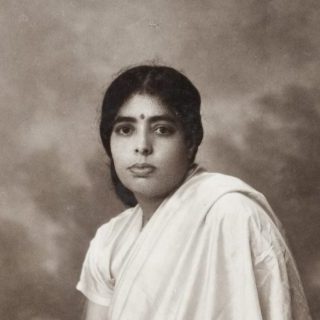The following essay celebrates the life and works of Indian botanist and cytogeneticist, Dr Janaki Ammal. A brilliant scientist and often the only woman in a room full of men, Dr Janaki was awarded the Padma Shri in 1977.
At a time where the country focuses on the importance of women’s education and employment, Edavaleth Kakkat Janaki Ammal, a botanist and cytogeneticist, best known for putting sweetness in India’s sugarcane varieties through her scientific methods, remains unknown outside of academia.
Janaki Ammal born in Tellicherry, Kerala inherited the curiosity and love for the natural sciences from her father, Dewan Bahadur EK Krishnan who was a sub-judge in the then Madras Presidency. He was a man who was deeply interested in science.
After completing her schooling in Tellicherry, Kerala, Janaki moved to Madras where she completed her Bachelor’s degree from Queen Mary’s College and her Honours degree in Botany from the Presidency College in 1921. After that, she started teaching at Women’s Christian College where she got the prestigious Barbour scholarship from the University of Michigan.
Janaki was among the few women who chose her career over marriage. A rather brave decision in those times. She completed her Master’s in Botany which was followed by a doctoral thesis on the same. After that, she returned to India and became a Professor of Botany at Maharaja’s College of Science in Trivandrum. She taught there for two years, between 1932 and 1934. The decisions that she took for her education become an inspiration for women even today, which is the choice to prioritize one’s hopes and dreams even if it means going against the set norms of society. Even though we consider ourselves to be surrounded by modernity, most women today are not encouraged to study more than required with the fear that it would result in the passing of the “marriageable age”. The hardships and comments Janaki had to endure because of her marital status did not stop her from exploring better and bigger educational opportunities around the world.
Her quest for knowledge led her to join the Sugarcane Breeding Station in Coimbatore, where she used her expertise in cytogenetics (the study of chromosomes and inheritance) to work on sugarcane biology. Janaki helped create a high-yielding strain of the sugarcane that would thrive in Indian conditions. Her research also helped analyze the geographical distribution of sugarcane across India.
Owing to her brilliance, Janaki was selected as a research fellow under C V Raman but she constantly faced gender and caste discrimination. It created problems with her male colleagues, who refused to look beyond her gender and caste. Scientific curiosity and an unyielding spirit, however, led Janaki to London where she joined John Innes Horticultural Institute as an assistant cytologist. Impressed by her work, the Royal Horticulture Society invited her to work as a cytologist at their campus at Wisley. At the Society, one of the plants she worked on was the magnolia shrubs. Her work ethics were so exemplary that the Society’s campus at Wisley named their magnolia shrubs after her: Magnolia Kobus Janaki Ammal.
In 1951, the then prime minister Jawaharlal Nehru personally invited her to return to India and restructure the Botanical Survey of India (BSI). In a quest to make a name for herself and do something for her country through her ideas and abilities she accepted the offer and was appointed as the Officer on Special Duty to the BSI. She restructured the organization in a way that helped BSI to better its operations.
Janaki did not limit herself to a certain sect of the society and was always interested to look beyond what academia had to offer. This is also why Janaki was not afraid to also travel to remote areas of the country in search of the plant lore of the indigenous peoples of the subcontinent. She would spend time searching for medicinal plants in Wayanad before visiting Ladakh to explore methods of sustainable agriculture at high altitudes.
Janaki was also an environmental activist. She took part in various protests that were held against environmental damage, one of which was the protest held against the building of a hydropower dam across the river Kunthipuzha in Kerala’s Silent Valley. Her active participation brought the credibility of a scientist to activism.
Janaki was also the only woman invitee to the landmark international symposium on environmental history, “Man’s Role in Changing the Face of the Earth” organized by the Wenner Gren Foundation for Anthropological Research at Princeton in 1955. Creating a space for women at a conference which had “Man’s Role” in its title.
It was Janaki’s individuality and belief in her ideas that led her to participate in conferences, protests, and events that had no space for women and were reserved for the privileged. She crossed every hindrance that life threw at her. Even her age could not stop her. After retirement, she continued researching. She served for a short period at the Atomic Research Station at Trombay before serving as an Emeritus Scientist at the Centre for Advanced Study in Botany, University of Madras. Few know that during her last years, Janaki’s main interest had been the rearing of a large family of cats and kittens.
For her exemplary contribution to science in India, Dr. Janaki Ammal was awarded the Padma Shri in 1977. In 2000, the Ministry of Environment and Forestry created the National Award of Taxonomy in her name. Janaki leaves her presence in the smell of Magnolia and her individuality in the sugar of Indian sugarcane reminding us that the result of believing in oneself is often sweet.
Books by Janaki


 Naina Ojha
Naina Ojha